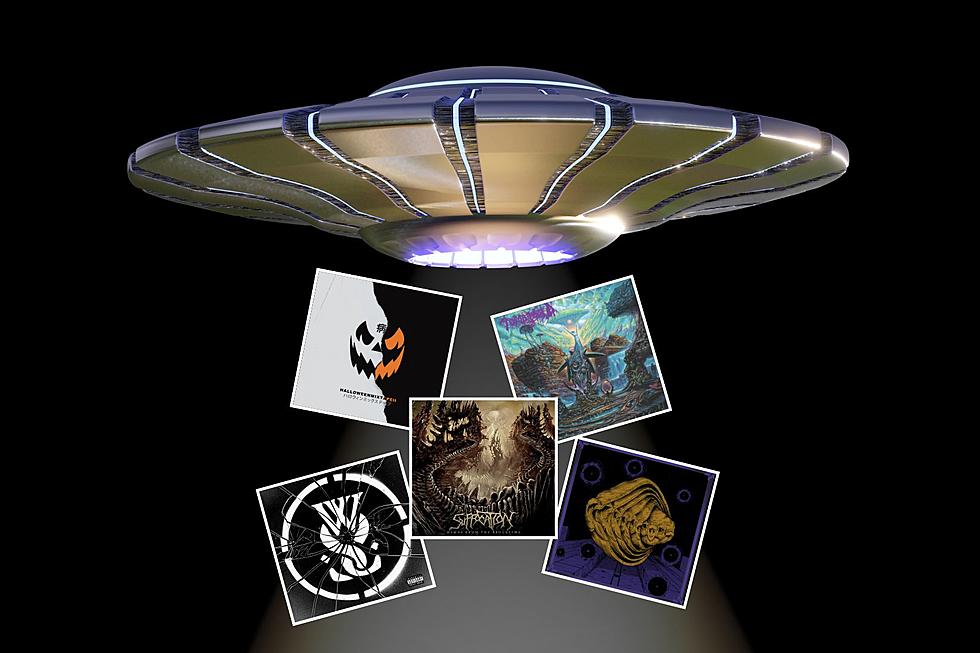
Suffocation Bassist Derek Boyer Talks ‘Pinnacle of Bedlam,’ Unique Playing Technique + More
As one of the most brutal, technical and unique bassists in metal, Derek Boyer has played for legendary death metal bands Dying Fetus, Decrepit Birth and, of course, Suffocation. With his bizarre style of twisted bass lines and playing his instrument vertically while resting the body of his bass on the floor, Boyer is also one of metal's most entertaining live performers.
We recently had a chat with Boyer about Suffocation's newest album, 'Pinnacle of Bedlam,' how he grew into his current playing style after a serious leg injury, his personal influences and much more. Enjoy our exclusive interview with Suffocation's Derek Boyer:
I wanted to start by thanking you for the show you recently played in Stamford, Conn. It was absolutely punishing, but especially for you, because I was told that you were puking blood from a serious night of drinking before going onstage.
Yeah, we tend to do that from time to time, preferably not before a show, but at that moment it just happened to go down that way. It was great though, within five minutes of going on I was able to get it together and do what I had to do. I mean, ultimately you shouldn’t be doing that before a show but being able to pull it off afterwards … [Laughs] it’s a story to tell.
‘Pinnacle of Bedlam’ is out now and ‘As Grace Descends’ and ‘Cycles of Suffering’ have been released as singles. How do those two tracks reflect on the rest of the record?
It’s really funny to me that the label is in love with ‘As Grace Descends’ and that they chose it for our video song. It’s interesting because you go with what the label thinks, but for me ‘As Grace Descends’ doesn’t have any slams in it and it wasn’t really the best showcase song in my opinion, but the label really liked it so we trusted them. It’s funny to see the kids online bashing it, like, “These guys, they used to play heavy but they don’t know how to play heavy anymore.” [Laughs] Somebody at Nuclear Blast just decided that’s the song they wanted to put out. They [the fans] judge a book by its cover without having heard the whole record. The record is really slammy, really brutal, fast, intense – it’s a very well-rounded record in my opinion, but ‘Cycles of Suffering’ is a bit more structured and more the ‘masterpiece style’ song as opposed to ‘Grace’ which is pretty straightforward. There’s some technical stuff but there’s also some really straightforward, catchy, heavy, slammy stuff so we’re really happy and proud with this record, man. It just came out great.
I think a lot of fans don’t understand that the label has a lot to do with the singles that are picked, but then those people who were bashing you go on to hear ‘Cycles of Suffering,’ I think they all just went “Oh, s--t!”
Yeah, they did kind of shut up. [Laughs] It was funny. Zeuss, the guy who mixed and matched it, helped produced it and is a great guy, and it was funny because when they first came out with ‘Grace’ he was like, “F---. Did we really f--- this up? A lot of kids are trying to rip on it.” And as soon as ‘Cycles’ hit, it really shut the naysayers up. Zeuss texted me and was like “Ha Ha! They’re not ripping on this one, are they?!”
It’s really about the content. If you throw down some really slammy content and that’s what the kids want to hear, or vice versa, if you put out nothing but slam and a lot of the fans are like, “Well we wanted to hear them grinding too. They’ve got [Dave] Culross (drums) too, so let’s grind it!” To just be able to mix it and make a well-rounded album, that was the main goal.
In my opinion, when it comes to Suffocation’s live show, you guys are the heaviest band on the planet even when playing stuff that’s 20 years old - it’s still the most brutal stuff out there. I think this album is the best record so far when it comes to replicating your live sound. Was that a goal for Suffocation when it came to making this record?
You know what? We are a live band and it’s one of those things where a lot of these young bands will get into the studio and they’ll really hyper, over-produce a record and edit the f--- out of the drums and put 17 guitar tracks or whatever it is that people are doing today to over-produce their records, editing and cutting up their stuff. For us, we’re a live band so we want to produce a record that’s as punchy as we can be live. No tricks, no frills – okay there’s a reverse f---ing snare hit over here, big deal. It’s not like we’re sitting there snipping it all up and moving s--t around. It’s a very natural, raw performance – that’s what we were looking to do, to capture a really natural performance, something we can pull off live. It was great getting it to sound really punchy and to crank it up in your stereos. It does what it’s supposed to do.
Now that Dave Culross is back, who played on ‘Despise the Sun,’ I actually got to speak to both him and Guy [Marchais, guitar] recently and they told me that on this album you can really hear some of that ‘Despise the Sun’ sound shining through with ‘Pinnacle of Bedlam.’ Do you agree?
Yeah, I think so. When Dave did the ‘Despise’ stuff, his lines were like a signature. To get him in there and he’s bomb blasting and playing slaughtering, fast double-bass and really grinding all day long, there’s definitely an aspect of the ‘Despise the Sun’ feeling throughout the record, definitely. For me, there’s some pretty fun writing, so it reminds me of ‘Pierced From Within,’ and then there’s the really hyper stuff, it’s not even that hyper in the grand scheme of things, but there’s a lot of grinding and a lot of bomb blasting and double-bass when Dave is behind the kit, so it just feels very intense. It’s got some new stuff too, so it’s kind of like a mix of the best stuff that Suffocation’s done and then also some new aspects.
Now that Frank [Mullen, vocals] is taking a bit of a step back when it comes to touring, I remember that Bill Robinson [Decrepit Birth] filled in for him on some recent shows, but there’s still that mystery of who’s really going to be Frank’s understudy. Is it possible that Bill is going to take that role in the future?
I don’t think that it will be Bill, unless there’s a timing thing, but we’ve got somebody really killer. Bill is awesome. Bill is a good friend of ours and I play in Decrepit Birth with him. He’s a great guy. Suffocation and Decrepit Birth have done a ton of touring together. Everybody is very comfortable when it comes to us hanging out with Bill, he knows how to command a crowd, and the whole thing with that timing issue when Frank wasn’t available, we’ve had to have Bill jump in and help us out.
We’ve got somebody really great lined up. I won’t necessarily say you’re not going to see Bill again, but that was him helping us out in a time when he was able to. We’ll see, for the most part Frank is going to do as much as he can and then we’ve got this other guy that’s going to stand in, that everybody knows and everybody loves – totally brutal vocalist. It’ll be really fun for us to be like, “Hey, it’s Suffocation with so and so from such and such as a surprise guest vocalist,” for two weeks and then Frank will do two weeks.
It’s one of those things where if we have to go to Europe and Frank can’t make it, well then maybe he [the mystery vocalist] can do the big festival show that kicks the tour off and we’ll have ‘so and so’ do it. For the most part Frank is going to do as much as he can and I wish I could announce who it is, but I’ve been instructed not to let the cat out of the bag about who the stand in vocalist is, but you guys will all see him soon.
[Editor's note: Following our interview with Boyer, it was announced that John Gallagher of Dying Fetus would be filling in for Frank Mullen on select dates on their 2013 spring tour.]
I actually saw you in the crowd of a Meshuggah show recently. When it comes to Dick Lovgren’s bass and especially the tone of his bass, it’s just as pummeling as something Suffocation can offer. Is he or any of Meshuggah’s past bassists an influence on you personally?
Not me personally. I saw Dick recently in New York City and they definitely have a really interesting thing going on with the whole show being mapped out in their in-ears, so they don’t even have to tap on the drums to start the songs anymore. Everybody involved, whether you’re onstage or in the lighting booth or in the merchandise booth, we were told that everyone is listening to a pre-recorded click track and everybody’s playing to this other file and inside their little ear piece, it’s telling them what song is going to be next and it just plays.
They’re definitely doing something a step above everybody else as far as their show, being lighting and everything all completely conducted, basically like a digital conductor keeping their show on a very strict path. There’s no room to be f---ing around and doing anything you want. The whole show is mapped out from the time it starts to the time they end their shows. With that, I’m inspired to say, “Wow they really raised the bar,” but as a bass player, I don’t look at Meshuggah for bass. [Laughs] I look at Meshuggah for interesting timing and stuff like that, but It’s really cool, the stuff that Dick is doing. I look at Meshuggah to be inspired by their odd timing rather than their actual bass.
Your playing style is pretty unique. I’ve never really seen an electric bass played like a cello before and I’ve noticed that you always keep your arm totally straight. Is that important when it comes to your technique?
When you first stand up with a bass and you put the strap on and you don’t know what the adjustment is, or the height, and you don’t know what you’re going to do necessarily … instinctually, at first I had my strap really high and then I started getting comfortable with my playing and I started lowering my strap and it got to the point where I need an extension for my strap - no strap is long enough. I had to cut a vinyl strap off of a backpack and sew that on, so instead of it being a four-inch vinyl piece now it’s a 12-inch vinyl piece so I have the extra leeway.
It just got to the point where when I started playing the B.C. Rich Warlock, I had suffered a really bad leg injury and I broke the bones between the knee and ankle. Both of them were multiple spiral fractures and I couldn’t really stand the way I wanted to stand and I still had obligations to be on the road and I didn’t want to stay home, but all of a sudden my stance and my style really changed due to my injury. My right leg was broken so bad I had to switch and put my left foot 90 degrees to the stage and it just changed everything. I ended up putting bass the down - it was so heavy I couldn’t lift the weight because of the leg injury. It’s interesting now that I’m completely 100-percent healed up now I’m really ambidextrous – it’s for fun now but it came out of necessity.
Who’s your No. 1 bassist of all time?
That’s really just the wildest question. The greatest guys in my book are Alex Webster, Steve DiGiorgio, Tony Cho – these guys are just monster players and me becoming friends with Alex, it’s so fun to be like, “Hey, check my bass out” and I’m playing on his bass. It’s really fun to be friends with the guys you looked up to and look up to. I still look up to those guys, they’re great musicians.
There’s a handful of guys out there that just crush and it’s super fun to know that you play in an aggressive band. There was an interview somewhere where they asked Alex, “What else would you like to do?” and he said, “Well, I’d like to do the Suffocation stuff,” like if it were something else he were doing other than Cannibal Corpse. It was really flattering to know that the guys you look up to also like the stuff that you’re doing. It’s super fun to be in the bass players union.
Watch Suffocation's 'As Grace Descends' Video
More From Loudwire









